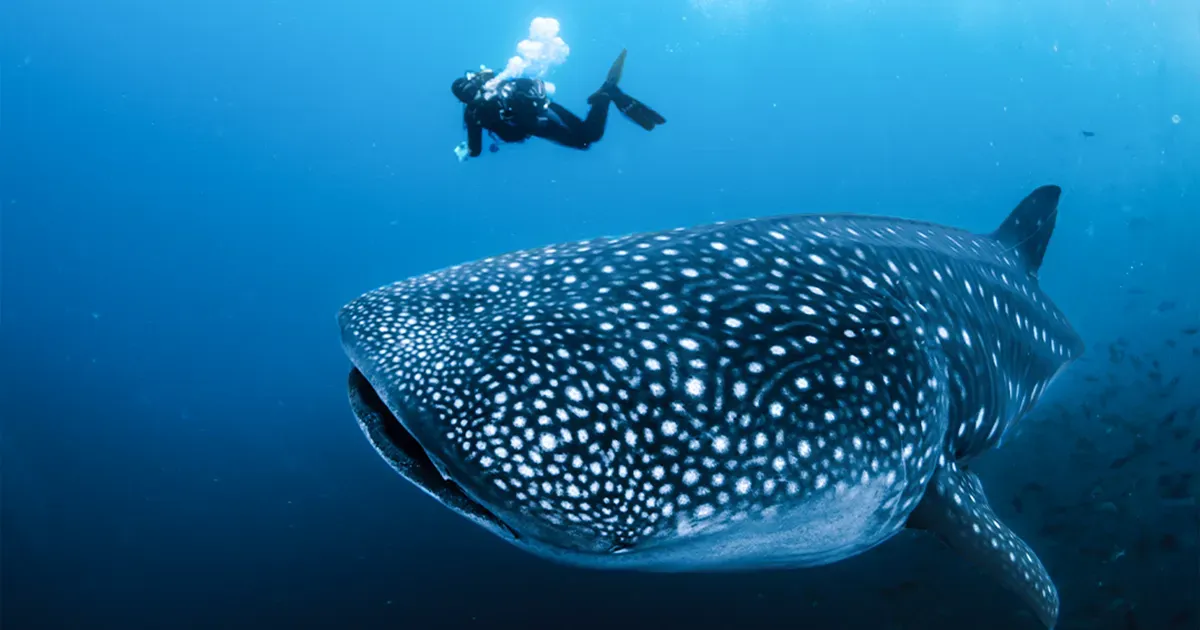The first time I saw whale sharks in Sumbawa, it was almost surreal. The morning sun had just started painting the water with golden streaks, and we were anchored in the quiet heart of Saleh Bay. A ripple appeared on the glassy surface, and then—there it was. A massive, spotted silhouette gliding beneath us, slow and unhurried, like it had all the time in the world.
I remember how the guide looked at me and whispered, “Just let it come to you.” At first, I thought he meant it as a poetic statement. But over time, I learned this was the very core of how we operate here. We never chase, and we never lure. The whale sharks decide when to show up, how long to stay, and when to leave. And that’s exactly how it should be.
The Beauty of an Unscripted Encounter
When you meet a wild animal on its own terms, there’s something profoundly different about the experience. You’re not intruding on its life—you’re simply crossing paths for a brief, magical moment.
I’ve been on other wildlife tours in different parts of the world where there’s a subtle (or not-so-subtle) pressure to “find something” for the guests, even if it means altering the animal’s behavior. That’s not how we do things here in Saleh Bay.
Watching whale sharks in their natural rhythm—feeding on plankton, cruising lazily along the surface, sometimes diving deep—is infinitely more rewarding than forcing an encounter.
Why Chasing Hurts More Than Helps
Whale sharks are the gentle giants of the ocean, but that doesn’t mean they’re unaffected by human presence. These creatures migrate thousands of kilometers every year, often returning to the same feeding grounds. Disturbing them by chasing can stress them, disrupt feeding patterns, and even make them avoid certain areas altogether.
I once saw, from a distance, another boat try to speed ahead to “intercept” a shark. The animal simply sank beneath the surface and didn’t reappear. The guests on that boat missed out on what could have been an amazing moment, all because they didn’t wait.
It’s a reminder that patience often brings the best reward—especially with wildlife as graceful as whale sharks.
The Problem with Luring
Luring often involves creating artificial feeding situations to keep whale sharks near the boat. While it might guarantee sightings in the short term, it risks changing the animal’s natural behavior. They might start associating boats with food, altering their migration patterns and making them more vulnerable.
Here in Sumbawa, the philosophy is different. Our aim is to observe without interfering, to keep the ecosystem as undisturbed as possible.
When you join a Saleh Bay whale shark tour, you’re stepping into the whale shark’s world—not inviting it into a staged one.
Letting the Ocean Set the Pace
One of my favorite things about these tours is that they feel unhurried. We head out early, find a good position in the bay, and let the day unfold. Sometimes a whale shark appears within minutes; other times, we wait a while, enjoying the scenery—mountains in the distance, seabirds diving, the smell of salt in the air.
And when they do arrive? The boat goes quiet. No shouting, no splashing, no rush. Just the sound of the water lapping against the hull as this enormous, peaceful creature moves past.
A Respect That Runs Deep
Local fishermen here have known these animals for generations. They call them “gurano bintang” — starry sharks — for the constellations of white spots on their skin. They’ll tell you stories about spotting them while hauling nets, about how the sharks would sometimes linger near the boats as if curious.
It’s this long-standing relationship between people and whale sharks that has shaped our approach. You don’t keep a friendship by chasing someone down or bribing them to hang out with you. You respect their space, and they come back on their own.
Guests Notice the Difference
I’ve had guests tell me, after their first encounter, “That felt real.” They mean it in the sense that nothing was staged—no one tried to control the moment. The shark came, we swam alongside for a while, and then it disappeared into the deep.
That’s what makes the memory last. You weren’t just a spectator; you were a respectful visitor in its home.
The Ripple Effect of Ethical Tourism
When people experience whale sharks in a natural, respectful way, they take that mindset home with them. I’ve seen guests start making small changes—reducing plastic use, supporting marine conservation projects, sharing stories that encourage others to travel responsibly.
Ethical whale shark tourism doesn’t just protect the animals; it changes us, too.
Why Patience is Part of the Adventure
Some days in Saleh Bay, we see multiple whale sharks. Other days, it’s just one or two. And yes, sometimes, we have to wait. But I’ve come to love that part of the trip. The waiting makes the sighting more rewarding.
It reminds me that these creatures aren’t there for our entertainment—they have their own lives, their own journeys. We’re lucky just to intersect with them for a moment.
Final Moments Before Departure
On my last trip, as we prepared to head back, a single whale shark appeared out of nowhere. It swam slowly beside the boat for several minutes, close enough that we could see the tiny remoras hitching a ride. It didn’t feel like the shark was there because of us—it felt like we happened to be in the right place at the right time.
And that’s the essence of why we never chase or lure. We believe the best encounters happen naturally, when we meet wildlife on their terms. The memory stays with you longer, and the ocean stays just a little wilder.
